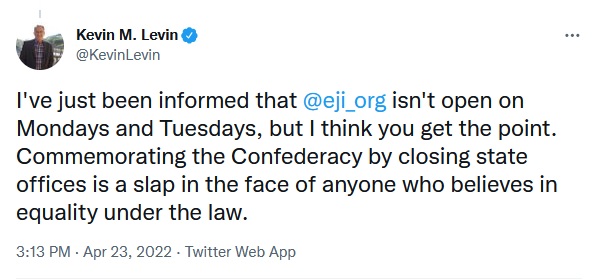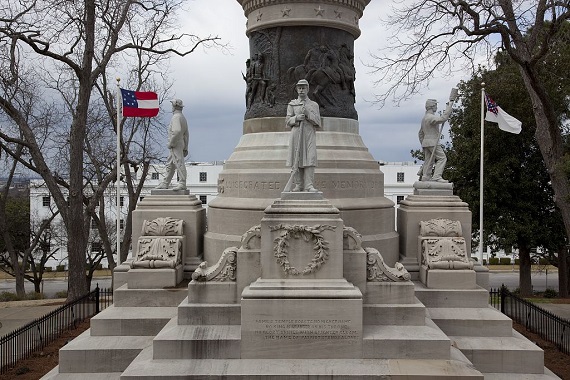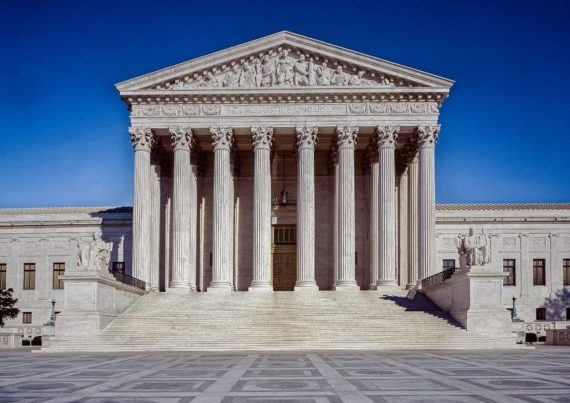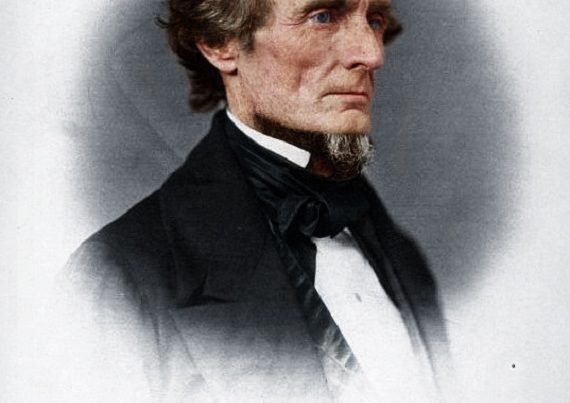Today is Confederate Memorial Day in Alabama. Most Americans believe the War and Southern history are synonymous, so much so that to many, the War has come to define the South. If you are reading this post and have followed the Abbeville Institute for any length of time, you know that our mission to “explore what is true and valuable in the Southern tradition” captures the four-hundred plus years of Southern history and the Southern tradition, a rich mosaic of people, place, and culture.
The War occupies an important part of that tradition, and for those who despise the traditional South, it offers an opportunity for “academics” to link “racism” and “injustice” to those that respect and even admire Confederate heroes and ancestors. You see, to these people, the Southern tradition is racism and white supremacy. In the process, these “scholars” create a false dichotomy of “righteous” and anti-racist Northerners with “evil” and racist Southerners.
As a result of our mission and the ongoing conversation about the War and its meaing, we spend some of our time writing about and discussing the War, both to parry attacks from these “academics” and to illustrate the “true and valuable” portions of the Confederate experience. Thus, our organization has been called “neo-Confederate,” whatever that means. We also highlight Northern hypocrisy and have fun poking holes in the Northern “treasury of [counterfeit] virtue.” This includes pieces that ridicule St. Abraham Lincoln and the “righteous cause myth” of the War, a myth that has now become commonplace among “academics,” both professional and amateur.
The “righteous cause myth” is multifaceted, but it relies on three key arguments to “prove” that the War was “about slavery” and “white supremacy:”
1. The secession declarations from several deep Southern States discuss slavery extensively.
2. Alexander H. Stephens said slavery was the “cornerstone” of the Confederacy in 1861.
3. The Confederate Constitution enshrined “Negro slavery” in the document and prohibited its abolition.
“Academics” then couple these arguments with post-bellum narratives about the “Lost Cause” and Jim Crow to show that not only did Southerners lie in the immediate aftermath of the War, they created Jim Crow to ensure that “white supremacy” would reverse the trend of Reconstruction and remain dominant in Southern political life. Confederate monuments, heritage groups, and holidays became the most conspicuous symbols of this attempt to “re-write” history by downplaying the importance of slavery in bringing about the War.
Take for example this quote from Auburn University Professor Adam H. Domby: “It [a Confederate monument in Gaston Co., NC] makes claims that are false. For instance, it claims the Civil War had nothing to do with slavery. Let me be very explicit as a historian: the Civil War had everything to do with slavery. There is no Civil War without slavery as an institution.”
The monument in question is mute on slavery. Its simple inscription reads: CONFEDERATE HEROES/ CSA / ERECTED BY / THE GASTONIA CHAPTER, / U.D.C. / AND THE / J.D. MOORE CHAPTER / CHILDREN OF THE / CONFEDERACY/ THE NOBLE SERVICE / OF THE SONS OF / GASTON COUNTY IS OUR / PERPETUAL HERITAGE/ UDC/ IN MEMORY OF / THE / GASTON COUNTY / SOLDIERS.
What are the “false claims”?
He cites a 1912 dedication speech to “prove” that the monument was erected to promote “white supremacy.” But that’s not what the inscription reads.
Domby, however, represents the current crop of leftist “academics” who take pride in propagating a false narrative about the South. You see, Southerners did talk about slavery in the post-bellum period, and many did say that slavery was an important issue in antebellum America. Some even lamented the eradication of the institution. And you know what, most of these Southerners were racist who said racist things and believed that blacks should not be able to vote, but as I have illustrated before, so did the vast majority of Northerners in American society both before and after the War.
But most Southerners would not tolerate equating the War to slavery, unless, as James McPherson has shown in his book For Cause and Comrades, it was to prevent their own “slavery” at the hands of a Northern dominated government and society.
To say that, “There is no Civil War without slavery as an institution” distorts the political situation in 1861. Lincoln made it explicitly clear that he did not go to war to free any slaves but to save the Union. In other words, the War had everything to do with power, not slavery. Lincoln could not let seven States depart in peace, as Winfield Scott suggested he do. He had to save his Party and by doing so sacrificed the original Union.
There were still eight SLAVE STATES in the Union in March 1861–nine if New Jersey is considered–and four technically remained so throughout the War, with West Virginia, an [illegal] slave State, joining the Union during the conflict. Neither Delaware nor Kentucky abolished slavery during the War and remained slave states until December 1865. Slave auctions were still found in Kentucky until November 1865. So much for the righteous cause.
If the War “had everything to do with slavery,” why didn’t the United States government abolish slavery immediately in 1861? Why did Lincoln go to great lengths to insist that the War wasn’t about slavery? Because it wasn’t. To argue that. “there is no Civil War without slavery as an institution” misses the point. Secession did not result in war until Lincoln forced the issue. If “slavery” and “secession” caused the War, why didn’t the War begin in December 1860, or January and February 1861? Because James Buchanan wasn’t going to use force to stop secession. A better statement would be, “There is no Civil War without Abraham Lincoln’s decision to resupply and reinforce Ft. Sumter and Ft. Pickens.” He willingly made that choice, even against the advice of his cabinet knowing that it would lead to war.
Regardless, leftist academics also float the myth that the Confederacy did not believe in the “rule of law.” This Tweet from “historian” Kevin Levin is a nice illustration:

First, very few Northerners believed in “equality under the law” during the War, meaning Levin has created another false dichotomy. Just read Leon Litwack or Eugene Bernwanger for a full picture of Northern “equality under the law.” You couldn’t live in the land of Lincoln if you were black.
Second, the Confederacy did advance equality under the law. Marshall DeRosa has explained in this piece on Confederate case law and this piece on a potential American Indian State, that Confederate courts were committed to the “equality under the law” during the War, even for non-white Southerners. His lecture at the Abbeville Institute Summer School last July shows that even in the case of homicide, slaves could be found not guilty in court on the basis of mere technicalities. If the Confederacy did not believe in equality under the law, that would have been impossible.
DeRosa’s articles, lectures, and forthcoming book on the topic of Confederate case law are more heroic than anything Domby, Levin, or other mainstream “righteous cause” mythologists can produce. They are swimming with the current, and by using statements like, “Let me be clear as a [sic] historian,” they attempt to bullwhip the other side into submission by highlighting their supposedly “superior” credentials. As John Lukacs noted in his outstanding book The Remembered Past:
This is not such thing as a definitive history, because there is not such as an objective history. All there is is the last word on the subject. But in history, unlike other human conventions, including law, the last word on the subject means something very different from the case is now closed. “The last word on the subject” means, rather, that the case has been reopened, as indeed it will be reopened, again and again, in the minds of human beings, in our minds.
The Abbeville Institute is dedicated to keeping the subject open no matter how hard the righteous cause mythologists insist that they have the last word and that the “case is closed.”







Outstanding short piece, Brian! Keep up the heroic work defending our glorious patrimony.
The case of General Lee’s slaves (Lee was the executor of his father-in-law’s estate) also proves your point concerning the rule of law. The Virginia Supreme Court ruled against Lee…during the War.
Blacks could own property in the South…blacks could not even move to Illinois and other northern states.
Of course, the Corwin Amendment would have forever (and permanently, without possibility of amendment, contrary to the current commander-in-chief who states “there are no absolute amendments”) protected labor relations as the sole purview of the States.
No amendment shall be made to the Constitution which will authorize or give to Congress the power to abolish or interfere, within any State, with the domestic institutions thereof, including that of persons held to labor or service by the laws of said State.
It certainly seems the northern House and Senate felt there was nothing illegal about slavery or that there was any right to interfere with the institution.
But let’s be truthful. The War was over money. Slaves were the main source of revenue for the federal government of the United States. The Southern States leaving the union removed this source of revenue. Without an income tax, the federal government was without funds if the tariffs on Southern exports could not be replaced. These slaves who were worth at least 300 dollars each (as verified by federal purchase of Washington, DC slaves in 1862) represented immense wealth to their owners…and to their future owner. Four million slaves at 300 dollars each equals 1.2 Billion dollars. The GDP of the United States in 1860 was 4 Billion dollars. Field hands were much more expensive…so let’s say a fair price, to avoid a War would be 2 Billion dollars…or half of the annual GDP.
In 2020 the GDP of the United States was 20 Trillion dollars.
I am pretty sure half of that sum would start a War…even today.
Deo Vindice Alabama.
Good article Brion.
It is of utmost importance, that every person that opens their mouth about the war being to free the slaves, recite the proposed Corwin amendment.
That lying professor shouldn’t be allowed to poison the vulnerable youth.
Well said Mr. Platt.
The root of all evil is also the root of all wars.
What a shame.
Money is not the root of all evil…the LOVE of money is the root of all evil. If I have ever misled the reader to believe money is evil, I apologize.
Much good is done with money as money is merely stored labor. Coveting someone else’s stored labor is the root of all evil…the love of money…you either love God or you love money…if you feel it is your right to sit and ponder the universe while someone else supports you, then you are willing to take their labor without compensation…THE BELIEF IN SOMETHING FOR NOTHING IS THE ROOT OF ALL EVIL.
I think the article missed an opportunity to state that both Abe Lincoln AND Jefferson Jefferson Davis BOTH issued public statements that the war was NOT about slavery.
None the less it is a great articalDand. Keep up he good work and keeping the truth alive!